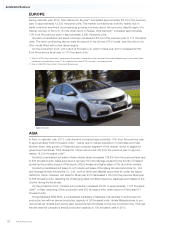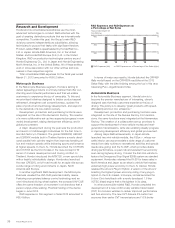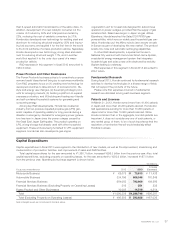Honda 2013 Annual Report Download - page 29
Download and view the complete annual report
Please find page 29 of the 2013 Honda annual report below. You can navigate through the pages in the report by either clicking on the pages listed below, or by using the keyword search tool below to find specific information within the annual report.6. Risks relating to pension costs and other postretirement benefits
Honda has pension plans and provides other post-retirement benefits. The amounts of pension ben-
efits, lump-sum payments and other post-retirement benefits are primarily based on the combination
of years of service and compensation. The funding policy is to make periodic contributions as
required by applicable regulations. Benefit obligations and pension costs are based on assumptions
of many factors, including the discount rate, the rate of salary increase and the expected long-term
rate of return on plan assets. Differences in actual expenses and costs or changes in assumptions
could affect Honda’s pension costs and benefit obligations, including Honda’s cash requirements to
fund such obligations, which could materially affect our financial condition and results of operations.
7. A holder of ADSs will have fewer rights than a shareholder has and such holder will have to act through
the depositary to exercise those rights
The rights of shareholders under Japanese law to take various actions, including exercising voting
rights inherent in their shares, receiving dividends and distributions, bringing derivative actions,
examining a company’s accounting books and records, and exercising appraisal rights, are available
only to holders of record. Because the depositary, through its custodian agents, is the record holder
of the Shares underlying the ADSs, only the depositary can exercise those rights in connection with
the deposited Shares. The depositary will make efforts to exercise votes regarding the Shares
underlying the ADSs as instructed by the holders and will pay to the holders the dividends and
distributions collected from the Company. However, in the capacity as an ADS holder, such holder
will not be able to bring a derivative action, examine our accounting books or records or exercise
appraisal rights through the depositary.
8. Rights of shareholders under Japanese law may be more limited than under the laws of other jurisdictions
The Company’s Articles of Incorporation, Regulations of the Board of Directors, Regulations of the
Board of Corporate Auditors and the Company Law of Japan (the “Company Law”) govern corporate
affairs of the Company. Legal principles relating to such matters as the validity of corporate proce-
dures, directors’ and officers’ fiduciary duties, and shareholders’ rights may be different from those
that would apply if the Company were a U.S. company. Shareholders’ rights under Japanese law
may not be as extensive as shareholders’ rights under the laws of the United States. An ADS holder
may have more difficulty in asserting his/her rights as a shareholder than such an ADS holder would
as a shareholder of a U.S. corporation. In addition, Japanese courts may not be willing to enforce
liabilities against the Company in actions brought in Japan that are based upon the securities laws of
the United States or any U.S. state.
9. Because of daily price range limitations under Japanese stock exchange rules, a holder of ADSs may not
be able to sell his/her shares of the Company’s common stock at a particular price on any particular
trading day, or at all
Stock prices on Japanese stock exchanges are determined on a real-time basis by the equilibrium
between bids and offers. These exchanges are order-driven markets without specialists or market
makers to guide price formation. To prevent excessive volatility, these exchanges set daily upward and
downward price fluctuation limits for each stock, based on the previous day’s closing price. Although
transactions may continue at the upward or downward limit price if the limit price is reached on a
particular trading day, no transactions may take place outside these limits. Consequently, an investor
wishing to sell at a price above or below the relevant daily limit may not be able to sell his or her
shares at such price on a particular trading day, or at all.
Honda Motor Co., Ltd. 27
























